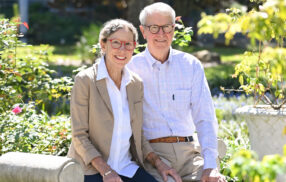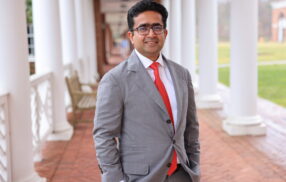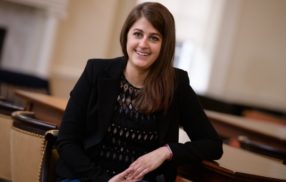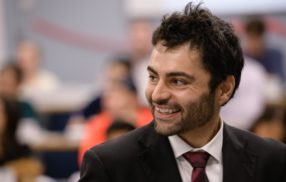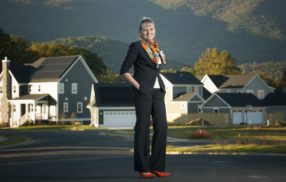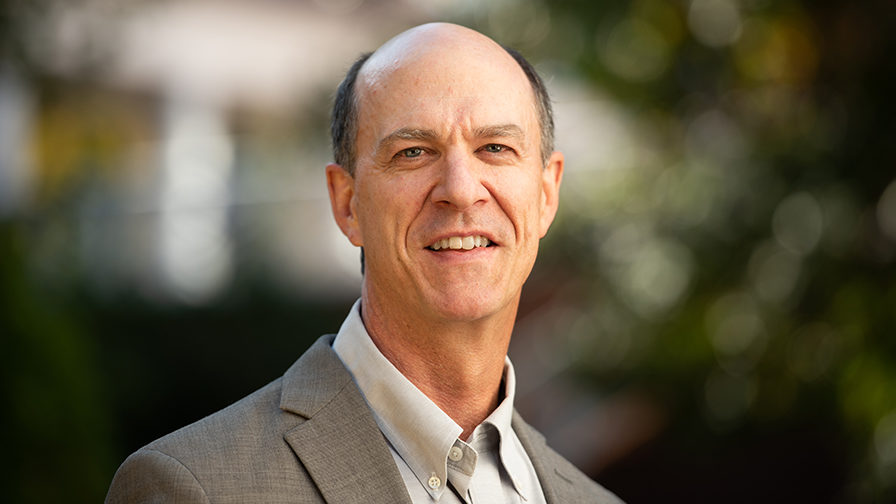
‘The Ultimate Questions’ and Why They Matter in Business
By Seb Murray
Who are we? Why are we here? What does it mean to live a good life? How should we get along with other people?
These “ultimate questions” may be spiritual and philosophical in nature, but they are posed to University of Virginia Darden School of Business students by Professor Andy Wicks — and are the subject of a new book he is working on.
An ethicist with a background in religious studies, he believes that these thought-provoking prompts encourage deep reflection and lead people to share different viewpoints. That, in turn, enriches the learning experience for all participants through group discussion and grows interpersonal skills that are catnip to corporate recruiters.
The ultimate questions are also used by Wicks, the Ruffin Professor of Business Administration, to examine both the theoretical and practical implications of ethics through courses on “servant leadership” and a course on creating value for all stakeholders, not just shareholders.
“Ultimate questions are not just things individuals think about and answer — they are embedded in business as well,” says Wicks. Brands today are answering the ultimate questions for us. What do they provide that makes us loyal? A good price, but also forms of differentiation and the expression of meaning.” By buying groceries from Whole Foods, for instance, you may also be buying into the company’s mission and values: to promote health and wellness across the world.
His classes aim to draw awareness to how the ultimate questions can create value for stakeholders. “It’s not just about making money for shareholders, which is important and one of the kinds of value stakeholders want. It’s about creating a variety of different kinds of value for all the groups of people that make up the firm.”
This ethos is in-step with the current business environment where corporations are embracing stakeholder capitalism and moving away from profit-at-all-costs — a transition highlighted by last year’s headline-making statement from the Business Roundtable.
Wicks believes that profit cannot be decoupled from purpose, even if the relationship between the two can be complex. “It’s rarely a zero sum game,” he says. “There are a number of studies that show if you focus on core stakeholders, it contributes to your financial success.” The latest research from Morningstar found two-thirds of sustainable investment funds outperformed their benchmark. The study highlighted no performance penalty from responsible investing, and potentially reduced risk or added alpha.
Will Values Be Pandemic-Proof?
There are concerns that the race to cut costs in response to the coronavirus pandemic could roll back progress toward sustainability. “It’s in hard times when we figure out what organizations really stand for,” says Wicks. “The presence of scarcity doesn’t mean we cease to care about others. It just means we have fewer resources to provide for them, just like with a family.”
This current business landscape has thrown up a wide range of ethical dilemmas that Wicks is incorporating into his teaching at Darden. He highlights the wave of hard questions. “Is it better to fire 30 percent of your workforce to save the other 70 percent, or should I try to keep everybody on with a temporary wage reduction?” The right answer may be found in talking to the workforce. “A lot of managers would make the decision in isolation, but it makes sense to draw on the perspective of all the stakeholders.”
He sees it as his responsibility as an educator to help produce future business leaders who care about more than profit maximization — this was a common charge levied at business schools in the aftermath of the 2008 global financial crisis. But Wicks says the split between ethics and economics goes back to the 1800s when tighter mathematical modelling led many economists to develop language and ideas that separate money and people.
“Business and capitalism are among the greatest forms of collaboration ever. But in moral terms, the language of economics tends to kill the sense of the humanity of business,” says Wicks.
“Some critics compare corporations to sociopaths — they will do anything to make a buck, but that is deeply problematic logic,” he adds. “At Darden, we are about training leaders to create organizations that actually help people, and make the world better through their products or services. And they are well paid if they do this, which is fair.”
Continuing the Legacy of Ethics Leadership at Darden
Ethics has been a formal part of the mandatory curriculum at Darden for decades, and Wicks has been at the heart of this teaching since joining the business school 18 years ago in 2002.
He obtained a master’s degree and Ph.D. in religious ethics from the University of Virginia. During his graduate studies, he spent time working in health care and teaching medical ethics to doctors and nurses. He knew he wanted to stay in a setting that allowed him to do applied ethics and became interested in business after taking a graduate seminar from Darden Professor Ed Freeman. Wicks ended up writing material for Freeman’s seminar, which led to work as a research assistant at Darden.
Wicks applied for a place on the faculty at the business school because of its commitment to ethics. “We have resources that most schools could only dream of,” he says. “I am one of four tenured faculty who are trained in business ethics. Very few business schools in the world can make that kind of claim.”
He holds several leadership positions at Darden, including director of the Olsson Center for Applied Ethics, academic director of the Institute for Business in Society, academic adviser for the Business Roundtable Institute for Corporate Ethics and director of Darden’s doctoral program.
He hopes to continue to play a central role in driving forward the business ethics agenda at Darden and in the corporate world through his research, teaching and prose. “Teaching ethics has been going on here for a long time — before the corporate scandals made it fashionable for business schools,” he says. “For all these reasons, this is the place I’ve been for a long time, and I would find it very difficult to leave. This is home.”
The University of Virginia Darden School of Business prepares responsible global leaders through unparalleled transformational learning experiences. Darden’s graduate degree programs (MBA, MSBA and Ph.D.) and Executive Education & Lifelong Learning programs offered by the Darden School Foundation set the stage for a lifetime of career advancement and impact. Darden’s top-ranked faculty, renowned for teaching excellence, inspires and shapes modern business leadership worldwide through research, thought leadership and business publishing. Darden has Grounds in Charlottesville, Virginia, and the Washington, D.C., area and a global community that includes 18,000 alumni in 90 countries. Darden was established in 1955 at the University of Virginia, a top public university founded by Thomas Jefferson in 1819 in Charlottesville, Virginia.
Press Contact
Molly Mitchell
Associate Director of Content Marketing and Social Media
Darden School of Business
University of Virginia
MitchellM@darden.virginia.edu




